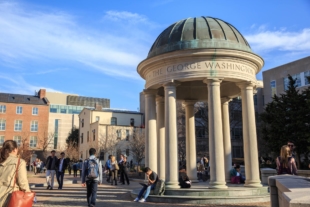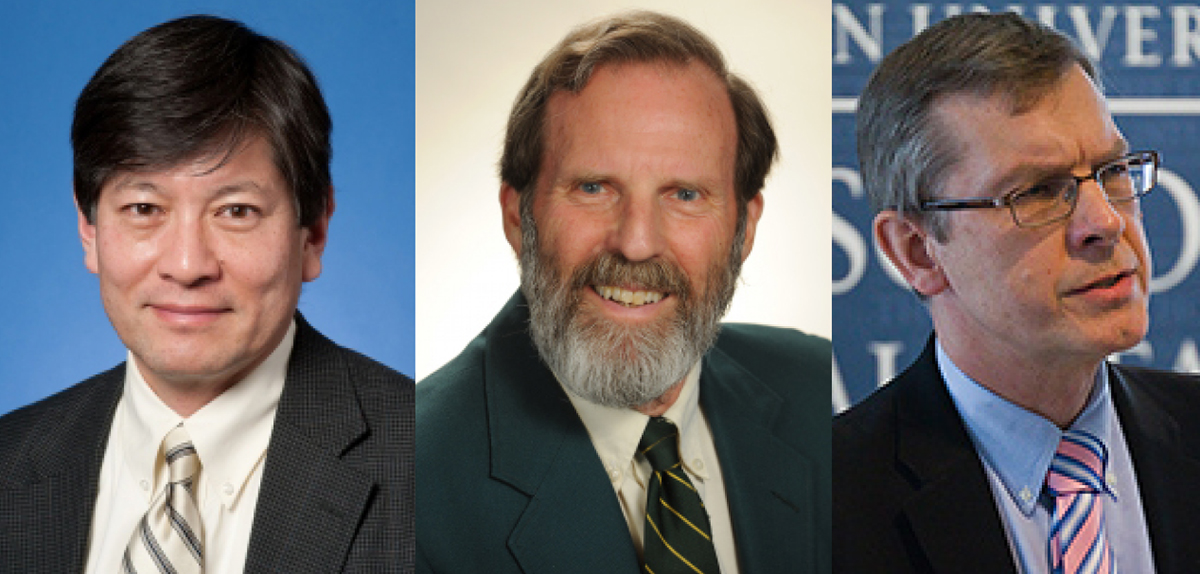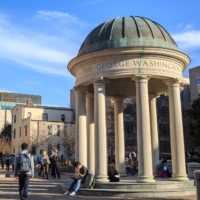The Japan-U.S. Leadership Program (JUSLP) of The George Washington University’s Elliott School of International Affairs offered a seminar series on the U.S. electoral process and the impact of President-elect Joe Biden’s victory on the Indo-Pacific region and U.S.-Japan relations. JUSLP is co-organized by The Japan Times and sponsored by Amway Japan G.K.
JUSLP, supported by the Japanese Ministry of Foreign Affairs and the U.S. Embassy, was created earlier this year on the 60th anniversary of the Treaty of Mutual Cooperation and Security between the United States and Japan, to prepare the next generation of leaders to serve as bridges between the two countries, ensuring they remain steadfast allies. It provides an intensive one-week executive education program on full scholarship that includes seminars at The George Washington University and other meetings in Washington and Grand Rapids, Michigan, that allow participants to exchange views with U.S. politicians and policy-makers, academic experts, business executives and community leaders.
JUSLP Executive Director Mark Davidson, also director of government and external affairs at Amway Japan, said, “The program’s goal is to enhance dialogue and trust between the United States and Japan, contributing to the peace, security, and prosperity of both nations and the Indo-Pacific region.”

The visit of the first JUSLP delegation from Japan to the United States, scheduled for May, was postponed due to the coronavirus pandemic. The George Washington University offered the online seminars to inaugurate the program virtually. Participants included applicants for the program, as well as alumni of the Georgetown University Leadership Program, a similar program that was offered between 2011 and 2018, organized by The Japan Times and Georgetown University with Amway as a sponsor.
Seminar faculty included professors Alan B. Morrison, associate dean for Public Interest and Public Service at The George Washington University Law School, Mike Mochizuki, an expert on U.S.-Japan relations and East Asian security at the Elliott School, and Christopher A. Kojm, director of the Elliott School’s Leadership, Ethics and Practice Initiative, who specializes in U.S. foreign policy and national security policy. Kojm also serves on Biden’s transition team.
The pre-election session on Oct. 26 focused on the process and issues related to the U.S. presidential race. Morrison analyzed the basics of the U.S. electoral system and the importance of the congressional election, which would determine the balance of power in Washington. He pointed out that due to the pandemic, mail and early in-person voting would reach record numbers in this election, and that candidates at all levels were focusing campaign activities on social media at the expense of legacy media such as newspapers and TV.
Kojm discussed policy differences between Republican Donald Trump and Democrat Joe Biden on issues such as the coronavirus pandemic and immigration. Echoing Morrison, he underscored that social media has increasingly funneled voters into information bubbles, providing people only news that reinforces their preexisting views. “This makes it difficult to reach the people on the other side of the aisle from you or even those in the middle,” Kojm said.
Mochizuki observed that the 2020 presidential candidates had spent more time attacking each other than debating policy differences. He pointed out that Trump and Biden had some differences on rivalry with China, the security of Taiwan and North Korean denuclearization, but stressed that both candidates share the view that Japan should take more responsibility for its own defense and firming up the bilateral relationship as a counterweight to China.
The second session on Nov. 18 focused on the results of the election and its impact on the Indo-Pacific region and bilateral relations.
Morrison and Mochizuki explained that the transition to a new administration was unusually slow due to Trump’s refusal to accept the election results, warning that further delay at a time of a pandemic and challenges to the global order could threaten U.S. national security.
Morrison pointed out that a run-off election in the state of Georgia on Jan. 5 would determine whether the Democratic Party or Republican Party would hold the majority in the Senate. Without power in the Senate, Biden will find it challenging to enact his legislative goals. Morrison attributed the inaccuracy of pre-election polling — which showed a greater lead for Biden than his eventual margin of victory — to the difficulty of reaching voters by cellphone and the reluctance of some conservative voters to talk with pollsters. Mochizuki predicted that the Biden administration would pursue a more multilateral approach to U.S. foreign policy, placing renewed emphasis on crucial alliances such as the U.S.-Japan partnership. The new U.S. administration’s primary focus in the region will be to counter Chinese influence in concert with other nations while minimizing chances for open conflict.
The session ended with the hopeful comment from Mochizuki that climate change is an area where Japan and the U.S. can exercise leadership together. “It would be good if the Biden administration can really show that dealing with the challenge of climate change is good for the American economy and it develops new jobs, and for that, it is good for the middle class and for the workers rather than something that will hurt them,” Mochizuki said.
JUSLP plans to institute in-person exchanges in 2021 as soon as public health conditions permit. For more information on JUSLP, including application criteria, see https://juslp.com/en/ .




